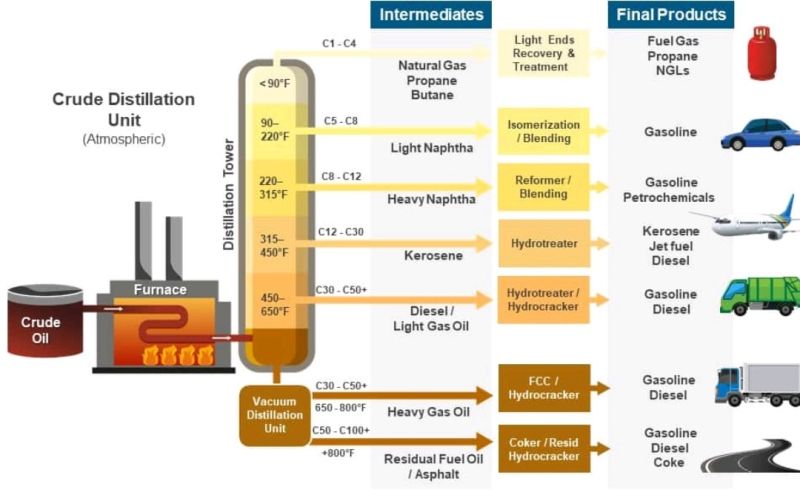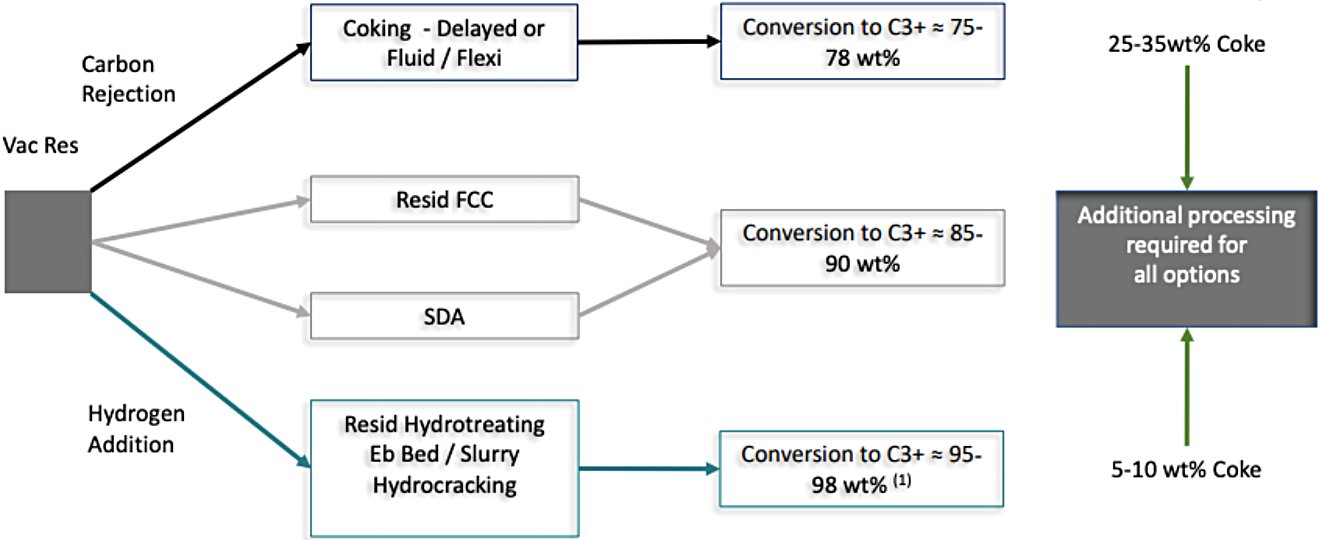Definition & Origin
Vacuum residue (VR) is the remaining fraction of a crude oil after removing the fuel and oil fractions by successive atmospheric and vacuum distillation. It is the non-volatile bottoms product of the vacuum distillation unit (VDU), which itself processes the atmospheric residue (AR) left after the primary crude distillation column. Vacuum residue is, literally, the bottom of the barrel.
Figure 1 — Crude oil boiling fractions and their uses [4]

The vacuum distillation unit operates at sub-atmospheric pressure (typically 50–100 mmHg absolute), allowing the heavier components of atmospheric residue to be fractionated at temperatures well below their atmospheric boiling points, thereby avoiding thermal cracking of the valuable gas oil fractions. Once the light and heavy vacuum gas oils (LVGO, HVGO) have been distilled off, the remaining non-volatile material exits the base of the vacuum tower as vacuum residue. The yield of vacuum residue from crude oil varies with crude quality and typically ranges from 15–30 wt% of the crude feed.
Physical & Chemical Properties
Vacuum residue is a black, extremely viscous to semi-solid substance at ambient temperature. It requires heating to flow and specialized equipment for transfer within the refinery. The following table summarizes its key property ranges:
| Property |
Typical Range |
| API Gravity |
2° – 10° API |
| Specific Gravity |
0.87 – 1.06 |
| Viscosity at 100°C |
500 – 50,000 cSt (18°–45° Engler) |
| Initial Boiling Point (atm. equiv.) |
> 495°C (> 923°F) |
| Sulfur |
1 – 7 wt% |
| Nitrogen |
0.3 – 1.0 wt% |
| Conradson Carbon Residue (CCR) |
15 – 30 wt% |
| Asphaltenes (n-C7 insolubles) |
5 – 30 wt% |
| Nickel (Ni) |
30 – 300 wppm |
| Vanadium (V) |
50 – 1,000 wppm |
The wide ranges reflect the significant variability in vacuum residue quality depending on crude origin. Light paraffinic crudes (e.g., West Texas Intermediate) yield vacuum residues with lower sulfur, lower metals, and lower CCR, while heavy asphaltic crudes (e.g., Venezuelan Merey, Canadian Cold Lake, Middle Eastern Safaniya) produce vacuum residues at the high end of all contaminant ranges. As examples of specific gravity variability by crude source: 0.87 for N'Kossa crude vacuum residue, 0.93 for Kuito crude vacuum residue, and approximately 1.00 for high-asphaltene asphaltic crude vacuum residues.
Chemical Composition
Vacuum residue is chemically the most complex and most contaminated fraction of crude oil. It is a complex mixture of high-boiling-point components, including:
- Heavy hydrocarbons: High-molecular-weight hydrocarbons such as asphaltenes, resins, and waxes; the asphaltene fraction consists of large, sheet-like polycyclic aromatic clusters insoluble in light paraffinic solvents
- Polycyclic aromatic hydrocarbons (PAHs): Complex aromatic molecules with multiple rings, which can be carcinogenic and toxic; present as large multi-ring naphtheno-aromatic structures
- Resins: High-molecular-weight polar compounds, partially soluble in light paraffinic solvents; intermediate between the maltene and asphaltene fractions
- Sulfur compounds: Organic sulfur-containing molecules such as mercaptans, sulfides, and thiophenic species
- Nitrogen compounds: Organic nitrogen in heterocyclic rings (pyridines, pyrroles, carbazoles)
- Heavy metals: Vanadium and nickel as the dominant organometallic species (porphyrinic complexes), plus iron and sodium at lower levels; chemically bonded predominantly to the asphaltene fraction
Challenges in Handling and Processing
Vacuum residue is often problematic for refiners due to several compounding factors:
- Viscosity: High viscosity leads to difficulties in pumping, transportation, and processing; requires heated pipelines, specialized positive-displacement pumps, and heat-traced storage tanks
- Corrosivity: The presence of sulfur compounds and heavy metals (particularly vanadium and nickel) causes accelerated corrosion and erosion/corrosion in processing equipment and pipelines
- Catalyst poisoning: Vanadium and nickel are potent poisons for hydroprocessing and FCC catalysts, severely limiting the direct processability of vacuum residue in conventional downstream units
- Toxicity: The presence of PAHs and other hazardous compounds poses environmental and health risks during handling and disposal
- Recalcitrance: The residue's complex molecular composition, very low H/C ratio, and extremely high boiling point make it inherently difficult to refine or upgrade without specialized processes
Position in the Refinery & Upgrading Pathways
Vacuum residue sits at the terminus of the primary separation sequence:
Crude Oil → Atmospheric Distillation → Atmospheric Residue → Vacuum Distillation → LVGO + HVGO + Vacuum Residue (bottoms)
Figure 2 — Crude oil boiling fractions and their uses [4]

If left unprocessed, vacuum residue can only be blended into heavy fuel oil (bunker fuel) or asphalt/bitumen — typically the lowest-value products in a refinery. The principal upgrading strategies are divided into two fundamental routes:
Carbon Rejection (removes carbon/asphaltenes, no hydrogen addition required):
Hydrogen Addition (increases H/C ratio by adding hydrogen):
Figure ? — Bottom of the barrel processing routes [9]

References
- CIRCOR (accessed: Feb 21, 2026). Residuum & Vacuum Bottoms
- Britannica. Vacuum Distillation (page version: Nov 9, 2018)
- ScienceDirect (accessed: Feb 21, 2026). Vacuum Residue
- Valero Energy (2020). Refining 101: Distillation Basics. Youtube video
- Eser S. FSC 432: Petroleum Processing — Processing and Conversion of Vacuum Distillation Residue. PennState - College of Earth and Mineral Sciences
- Haz-Map (accessed: Feb 21, 2026). Residues (petroleum), vacuum
- Romero, S., Becht Engineering (Oct 6, 2020). The Role of Solvent Deasphalting (SDA) in Refining. Refining Community
- Vista Aseman (Oct 30, 2023). Vacuum Residue (VR): Applications, Composition, Production, and Industries
- TheFreeDictionnary (accessed: Feb 21, 2026). Tar
- Larson M., KBC (2019). Bottom of the Barrel Conversions: What Does the Future Hold? Refining Community


 CAS Number
CAS Number
 EC Number
EC Number









